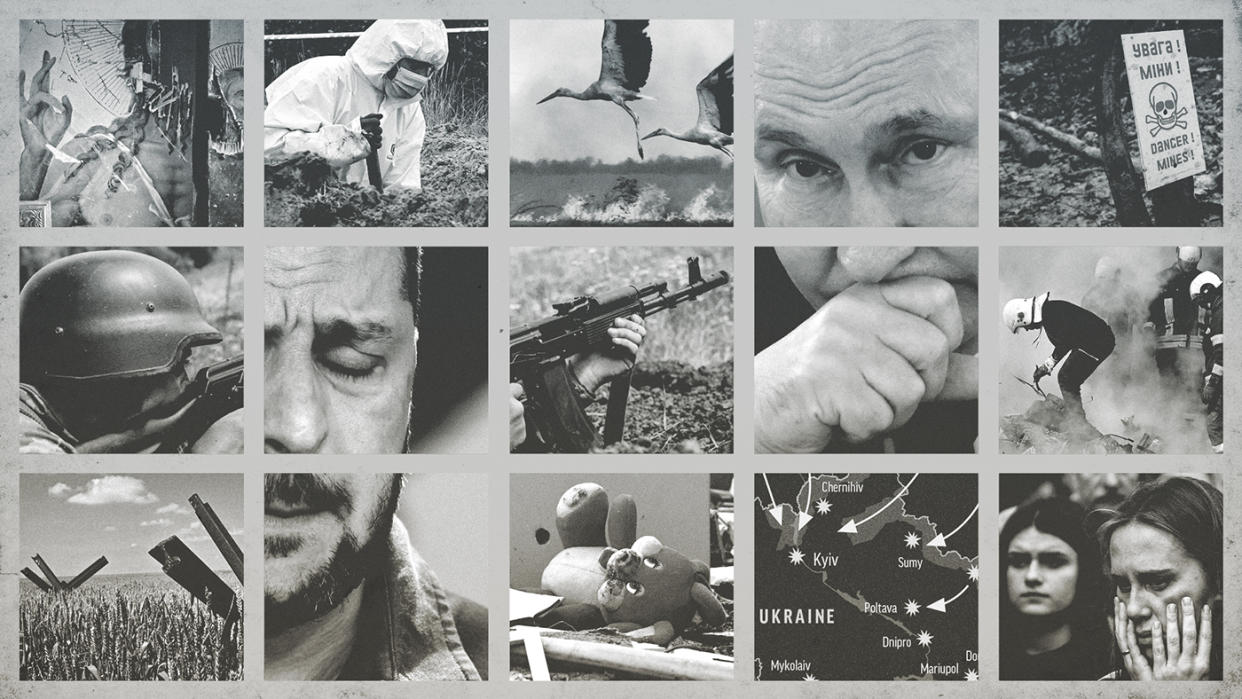Who's winning the war in Ukraine?

A massive injection of US aid has come "just in time" for Ukraine's beleaguered defenders, although for the time being the impact is mostly psychological.
The US committed to an aid package worth $61 billion (£49 billion) in late April, "after months of dithering" in Congress, said The Economist. The hard-won vote "ensures that 2024 will not be the year the US abandons Kyiv to defeat at the hands of Moscow", said Bloomberg, an outcome that would have "sent geopolitical shockwaves around the world".
But analysts have warned that reversing recent Russian gains will be a huge challenge for Ukraine's forces – and Kyiv may be running out of road.
White House national security adviser Jake Sullivan acknowledged that "it’s going to take some time for us to dig out of the hole that was created by six months of delay" in Congress.
Ukraine must reinvigorate its stalled campaign and turn the tide of the war if it hopes to "sustain American political support before burning through the latest influx of money", said The Associated Press. Whether it can pull that off "remains unclear".
What has happened recently?
As Kyiv's allies in the US Congress attempted to wrangle the $61 billion aid package through both Houses, Russian forces took control of the eastern city of Avdiivka, their most significant gain this year. The fiercest fighting currently is centred on the town of Chasiv Yar, to the north of Avdiivka, as Russia attempts to open a path into the contested Donetsk province.
The Kerch bridge, which connects occupied Crimea to Russia, is another hotspot. To Ukraine, the 12-mile bridge "is a hated symbol of the Kremlin's illegal annexation", said Luke Harding in The Guardian.
To Russian president Vladimir Putin, it is "a tangible reminder of what he sees as one of his greatest political achievements", as well as a crucial military supply route. But there are "serious doubts" as to whether Ukraine can recapture the hotly contested crossing.
All this has come at a cost for Russia, too, said The New York Times. Casualty estimates circulating among military analysts, pro-Russian bloggers and Ukrainian officials suggest that Moscow "lost more troops taking Avdiivka than it did in 10 years of fighting in Afghanistan in the 1980s".
The death tolls on both sides of the conflict are mounting. Some 31,000 Ukrainian soldiers have been killed since the beginning of the invasion, Ukraine's president Volodymyr Zelenskyy said in February. Last month, the BBC's Russian unit reported that Moscow had lost more than 50,000 soldiers in the conflict so far, the grisly result of its "so-called meat grinder strategy". This is its tactic of sending "waves of soldiers forward relentlessly to try to wear down Ukrainian forces and expose their locations to Russian artillery".
What does victory look like for each side?
Before Russia launched its invasion in February 2022, Putin outlined the objectives of what he called a "special military operation". His goal, he claimed, was to "denazify" and "demilitarise" Ukraine, and to defend Donetsk and Luhansk, the two eastern Ukrainian territories occupied by Russian proxy forces since 2014.
Another objective, although never explicitly stated, was to topple the Ukrainian government and remove the country's president, Zelenskyy. "The enemy has designated me as target number one; my family is target number two," said Zelenskyy shortly after the invasion. Russian troops made two attempts to storm the presidential compound.
Russia shifted its objectives, however, about a month into the invasion, after Russian forces were forced to retreat from Kyiv and Chernihiv. According to the Kremlin, its main goal became the "liberation of the Donbas", including the regions of Kherson and Zaporizhzhia – but Moscow has made little progress in achieving this aim.
Ukraine's main objective is the liberation of its occupied territories. That includes not just those held by Russia since the February 2022 invasion, but a return to its internationally recognised borders, including Crimea.
Can Ukraine win the war?
After weeks of blistering aerial bombardments of Ukrainian positions, there's a "great risk" of the defensive lines "collapsing wherever Russian generals decide to focus their offensive", said Politico.
A senior Ukrainian military source told the news site: "There's nothing that can help Ukraine now because there are no serious technologies able to compensate Ukraine for the large mass of troops Russia is likely to hurl at us."
The Russian military benefits "from a sizeable advantage in manpower", said the BBC, and a "formidable" fightback halted Kyiv's counteroffensive last year, raising the prospect that Russia could simply "outgun" Ukrainian defences this summer.
Last month, Zelenskyy lowered the age of military conscription in Ukraine to 25 in an attempt to boost troop numbers. The reason for the decision was "not immediately clear", said the BBC, but Zelenskyy had "previously warned of plans Russia may have to launch a spring or summer offensive".
But conscription remains a touchy topic in Ukraine, and officials have had to tread lightly amid dwindling enthusiasm for military service. "We don't only have a military crisis – we have a political one," one of the officers speaking to Politico warned.
Only two elements could still upset the "grim dynamics", another official said: "Ukrainian grit and resilience" and "errors" by Russia.
Ukraine's priority should be thinking about a "theory of victory", defence analyst Konrad Muzyka told The Telegraph in December. Whether retaking Crimea remains the ultimate objective or the more modest ambition of regaining the territory lost since the Russian invasion, Ukraine's leadership "needs to articulate that one way or another".

